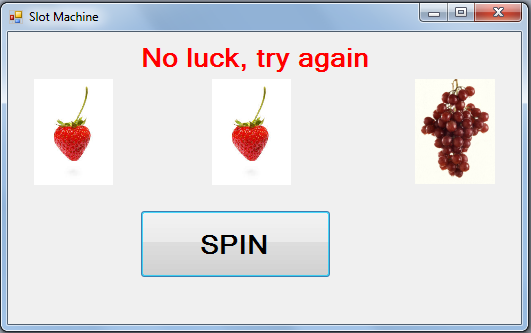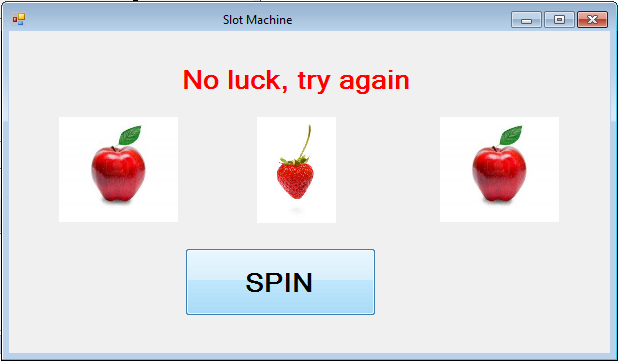Slot Machine Programming Code C++
Posted : admin On 8/1/2022I was bored and that can be a dangerous thing. Like doodling on the phone book while you are talking on the phone, I doodle code while answering questions on DIC. Yeah, it means I have no life and yes it means I was born a coder. During this little doodle I decided to make a slot machine. But not your standard slot machine per say, but one designed a little bit more like the real thing. Sure it could have been done a little more simpler and not even using a Wheel class at all, but what fun is that? In this entry I show the creation of a slot machine from a bit more of a mechanical aspect than a purely computerized one. It should provide a small sampling of classes and how they can represent real life machines. We cover it all right here on the Programming Underground!
- Slot Machine Programming Code C++ Python
- Slot Machine Programming Code C++ Java
- Slot Machine Programming Code C++ Ro Ghoul
- Slot Machine Programming Code C++ Download
- Slot Machine Programming Code
So as I have already said, this little project was just something to play around with. It turned out kinda nice, so I thought I would share it. But what did I mean about it being mechanical in nature? Well, if you have ever played a real slot machine, not the digital ones they have in casinos now, you would see a metal case with a series of wheels. Typically it would be three wheels with pictures on them. When you put your money in and pull the handle the wheels would be set into motion. They would spin and then the first wheel would stop, followed by the second and then the third. After they have all stopped, the winnings are determined and you are paid out in coinage or credits.
Slot Machine Programming Code C++ Python


I thought, why not be a bit mechanical in this slot machine design and create the wheels as a class called “Wheel” and give it the ability to spin independently of the other wheels? Have the wheel keep track of which picture (or in our case number) is flying by and report the results to the actual slot machine class. I could have done this mechanism without the need of a wheel at all and instead load up an array and have it randomly pick a number from the wheel. Little slimmer, little more efficient but wouldn’t show much programming theory.

The way it was explained to me once is that the spinning of the reels (whether physical or on a video screen) is pretty much completely insignificant window-dressing and feedback for the player. Slot machine c# code is used in the programming for slot machines (or for any other gaming need) because C and C are the most gaming friendly coding languages. These programming languages allow the freedom to develop a useful and smooth gaming app. IT and development firms are offering these programming and coding services to their clients in a customized and need-based manner and that too at competitive prices. See how high you can go on my C slot machine game! Code wise, next try to use arrays or std::vector. Articles and news about the C programming language.
What do we gain by recreating these Wheel classes and spinning them independently? Well, you gain a slight bit of flexibility. Independently we are able to control the speed of the spinning if we wanted to, we are able to grasp the idea of the wheel as a concept in our mind and manipulate it. We could easily built in features like if the wheel lands on a certain number it will adjust itself. Like some slots in Vegas, if you land on lets say a rocket in the center line, the machine would see the rocket and correct the wheel to spin backwards 1 spot (in the direction of the rocket as if the rocket was controlling the wheel). We could spin one wheel one way and another wheel another. We could inherit from that wheel and create a specialized wheel that does a slew of new different behaviors. All encapsulated into one solid object making the actual Machine class oblivious to the trickery of the wheel itself… encapsulation at its finest!
Slot Machine Programming Code C++ Java
The machine class we create will contain 3 pointers. Each to one of the wheels. The machine itself will be in charge of a few different tasks. Taking money, issuing and removing credits, determining when to spin, telling each of the wheels to spin and checking our winnings based on some chart we create. It has enough on its plate than worrying about the wheels and reading their values.
So lets start with our Wheel class and its declaration/implementation…
wheel.h
As you can see the wheel itself is not a difficult concept to envision. The bulk of the work is in the read() method. Here we simply read the values from our internal array of integers (the values on the wheel) and return those values as an array of the three integers… representing the visible column. This column will then be loaded into our 2-Dimensional Array back in the Machine class. The 2D array represents the view or screen by which the user sees the results. Remember that the user never gets to see the entire wheel. Only the 3 consecutive values on the face of the wheel.
Here is how it may look in the real world. We have our machine with the three wheels and our 2D array called “Screen” which acts as our viewing window. Each wheel will report its values and those values will be put into the screen…
Below is our machine class…
machine.h
This looks like a lot of code but really it is not if you look at each function. Most of them are very very simple to understand. We have a spin method which essentially spins each of the wheels, reads their values back from the Wheel class into a pointer (representing each column), then they are loaded into the 2D array one column at a time (our view screen), printed for the user to see the results and lastly the winnings are checked. The checkwinnings() method determines which rows to check based on the amount of the bet. If they chose 1 line, it checks for winning combinations on the middle row only. If they choose 2 lines, it checks the middle and top lines, 3 line bet checks all three horizontal rows, 4 line bet checks the first diagonal as well and 5 line bet checks both diagonals in addition to the lines.
How does it check the lines? Well each line is given to the checkline() helper function which compares the 3 values of the line against an enumerated type of various symbols. Here we are just assigning a symbol against each numbered value to help the programmer determine which numbers correspond to which winning combos. For instance, luckyseven represents the number 3 in the enumeration. So if it runs across a line with 3 number 3s, then it knows it hit the grand jackpot and credits the player 1000. This method makes things easy because if we ever wanted to change the win patterns later, we could change the enum and checkline method to do so. We could also build in multiple types of symbols and even let the user choose what slot machine game they want to go by. It becomes very flexible and is a testament to great design!

Lastly we can put some tests together just to show some the various aspects of how this thing works and how the programmer can use the classes…
Slot Machine Programming Code C++ Ro Ghoul
slotmachine.cpp
Slot Machine Programming Code C++ Download
This simply inserts a 5 dollar bill and a coin for good luck. Then bets 5 lines and spins. Despite the outcome we go and bet five lines again and spin once more. Hopefully we win something this time around! But either way, those are the classes for you and I hope you like them. As always, all code here on the Programming Underground is in the public domain and free for the taking (just don’t cause a mess in isle 3, I am tired of running out there for cleanup). Thanks for stopping by and reading my blog. 🙂
Slot Machine Programming Code
|